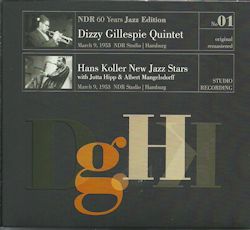Dizzy Gillespie Quintet
1. They Can't Take That Away From Me
2. Alone Together
3. Manteca
4. Tin Tin Deo
5. I Can't Get Started
Dizzy Gillespie – Trumpet
Bill Graham - Baritone sax
Wade Legge – Piano
Lou Hackney – Bass
Al Jones – Drums
Hans Koller New Jazz Stars
6. The Way You Look Tonight
7. Indian Summer
8. You Go to My Head
9. All the Things You Are
Hans Koller - Tenor sax
Albert Mangelsdorff – Trombone
Jutta Hipp – Piano
Shorty Roeder – Bass
Karl Sanner - Drums
Germany’s NDR radio station claims to have recorded
more than 2000 jazz programmes since 1952, and it now intends to release
some of them commercially for us all to hear. The first in the series
is this album, which features quintets led respectively by trumpeter
Dizzy Gillespie and tenorist Hans Koller. It was recorded in March
1953. I wish the British Broadcasting Corporation had such riches
in its archives – but I expect that most of the broadcasts made have
been deleted.
In general, I prefer Dizzy Gillespie’s work with small groups to his big bands, where he tends to play louder and with less subtlety than in groups like
the quintet here. In these five tracks, he occasionally resorts to the stratospheric notes which he so often employed in his big bands, but he is usually
more restrained – and the high notes make more sense in the context of particular solos, especially when Bill Graham’s baritone sax provides a contrast by
bringing the sound level down low.
The Gillespie set consists of three quite slow tunes and two of his oft-played Latin-American features: Manteca and Tin Tin Deo. Dizzy’s
solo in the latter is remarkably adept.
At this time, Hans Koller’s quintet was one of the leading jazz groups in Germany, and at times it sounds “cooler” than Dizzy’s (with a style influenced by
Lennie Tristano), even though its repertoire consists of well-worn jazz standards. Of course, trombonist Albert Mangelsdorff was destined for great things,
becoming an internationally famous musician. He and Hans Koller both play very fluently, with Koller occasionally creating a tone similar to Stan Getz’s.
Most surprising of all is pianist Jutta Hipp, a name I have heard before but whose recordings are rare because her career in jazz ended in the late 1950s.
Her crystalline piano solos here suggest that she certainly had the talent to become well-known if she had continued playing jazz.
The recording quality of this album is notably good for its time. The only drawback is that this CD only contains just over 35 minutes of music.
Tony Augarde
www.augardebooks.co.uk
